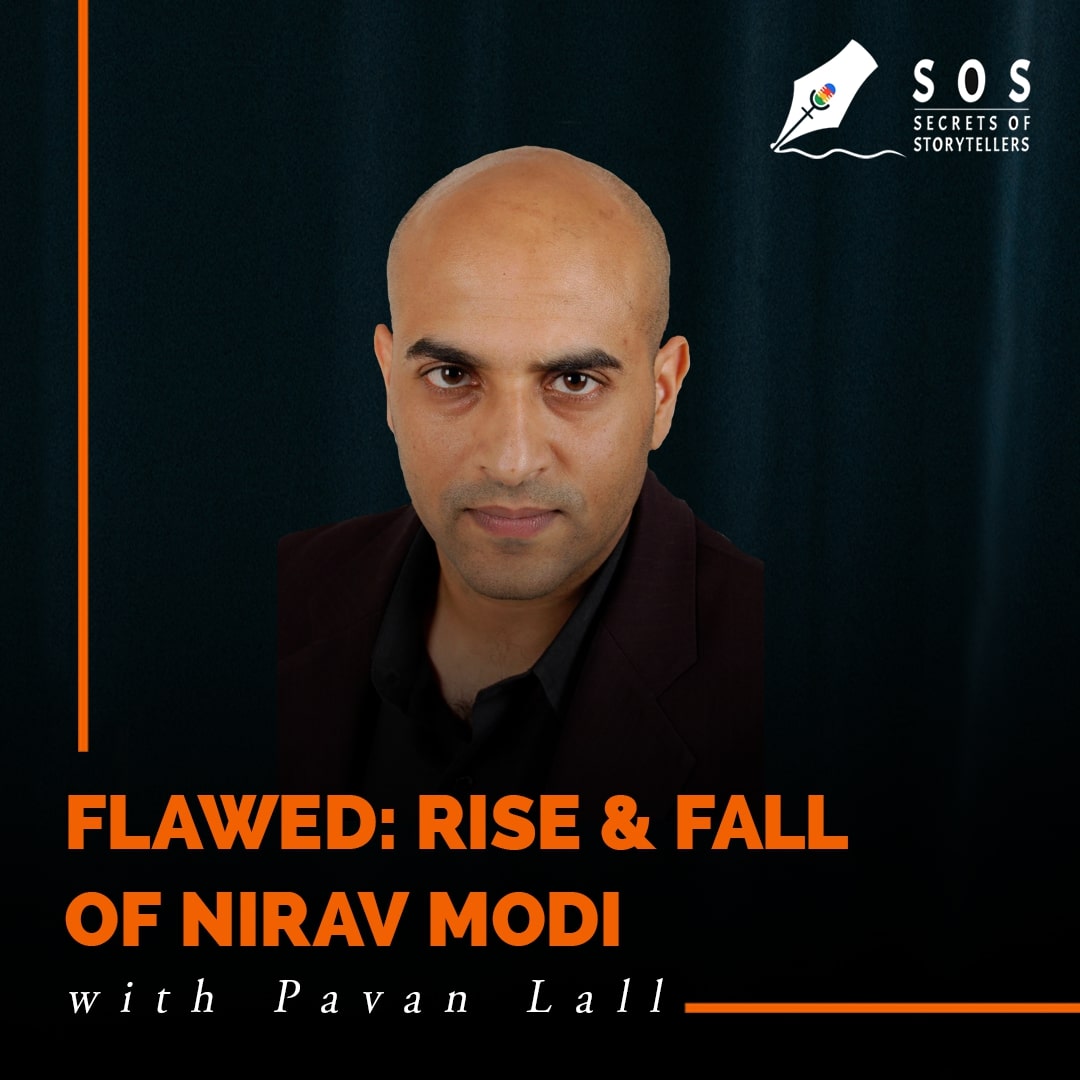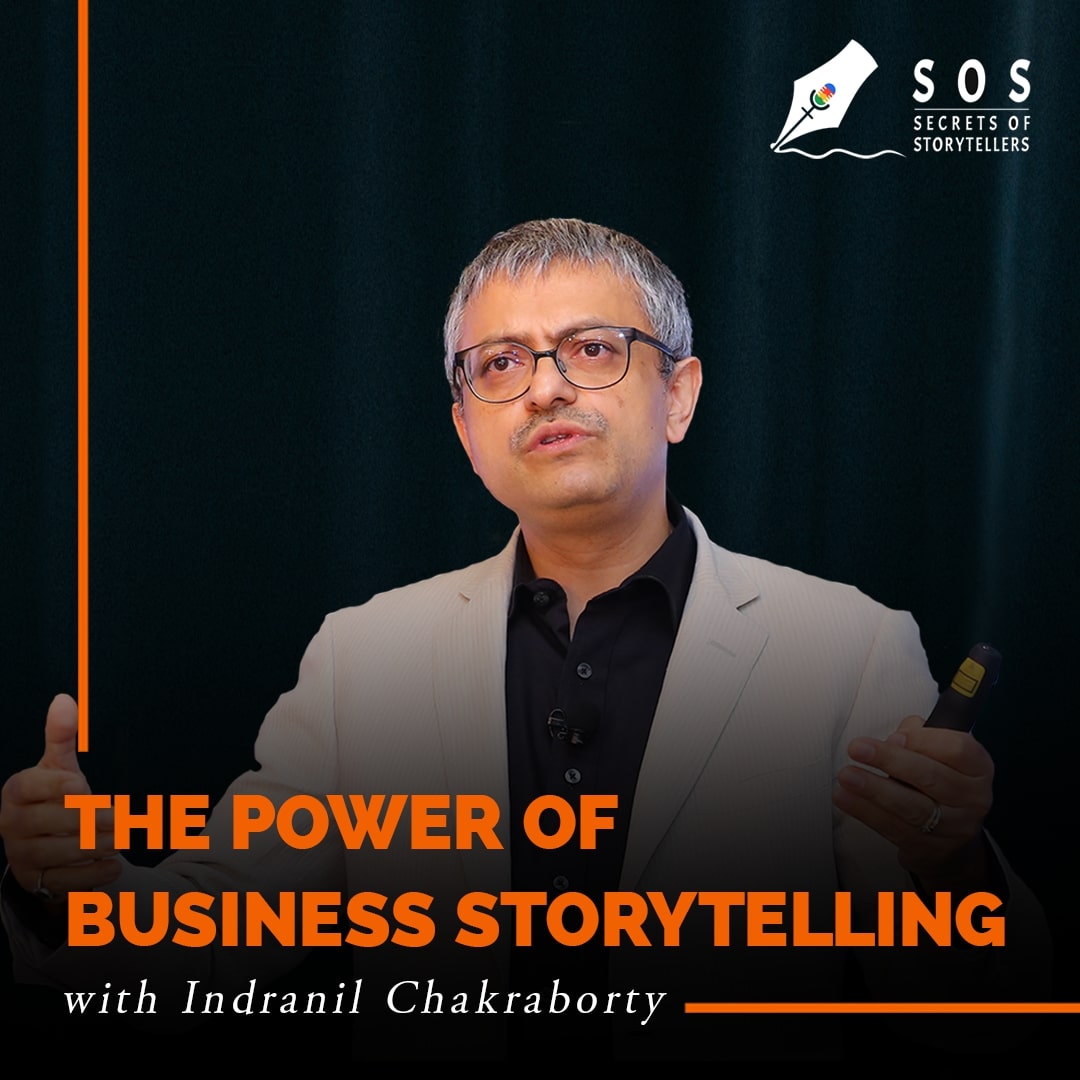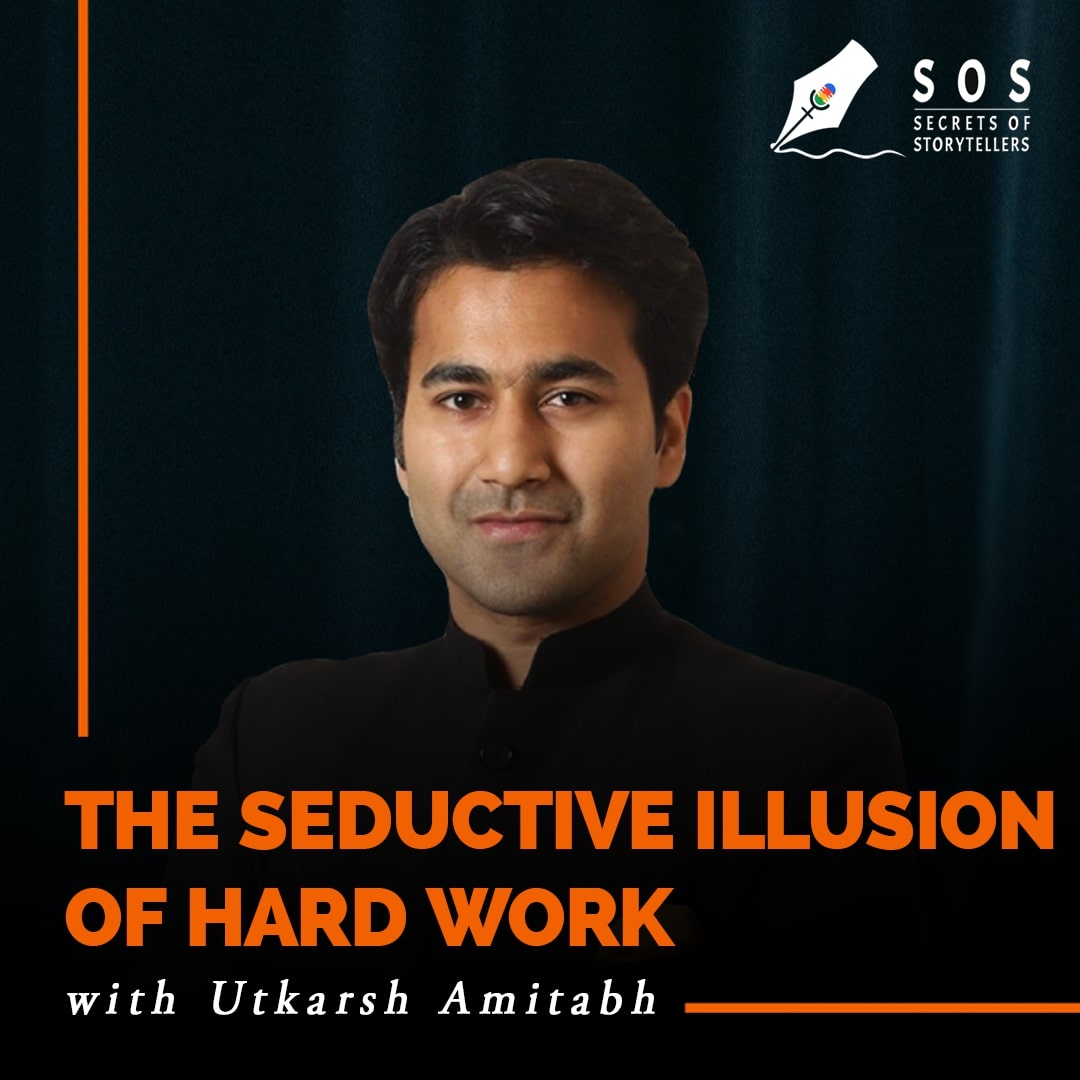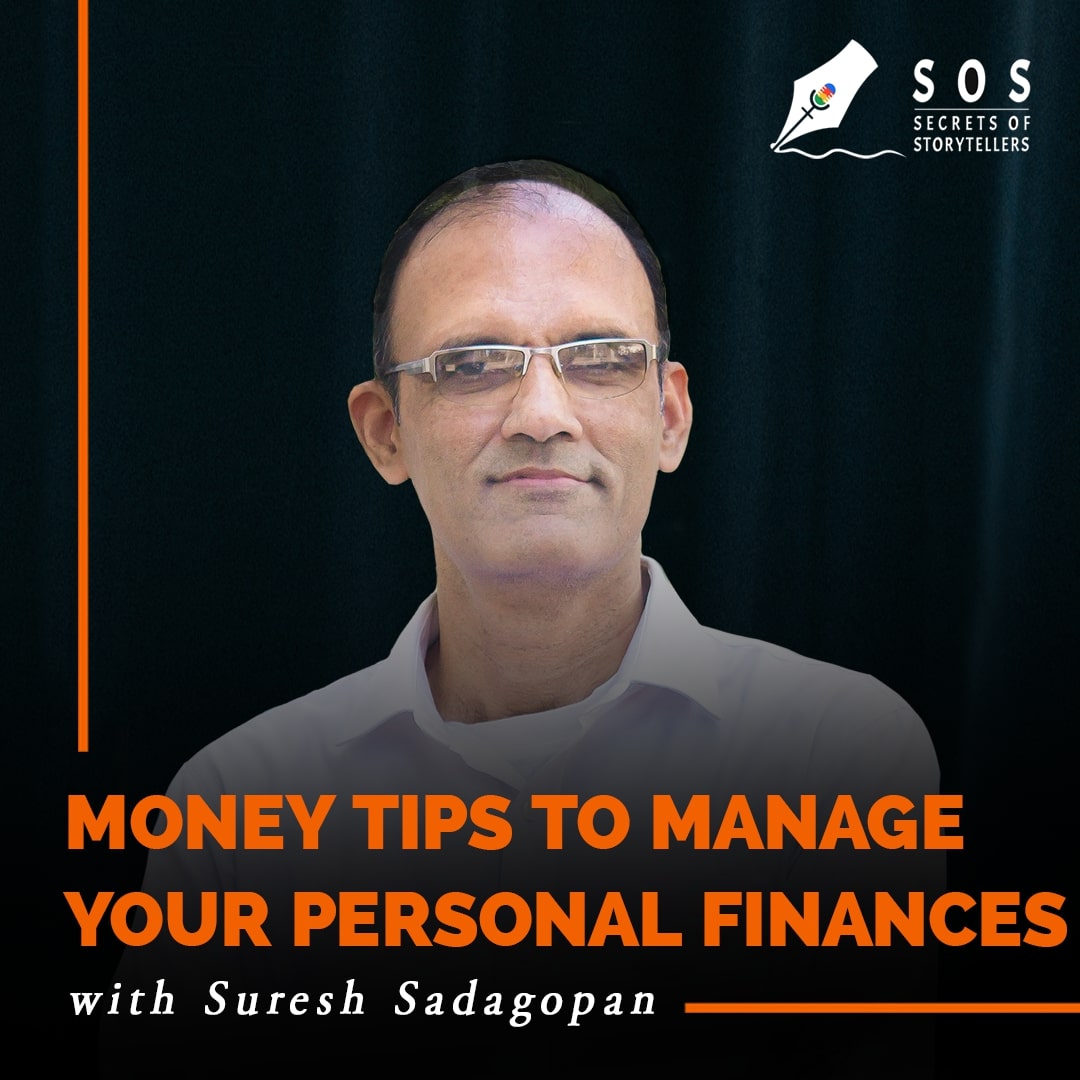Shubham(00:01) -
We're discussing about Nirav Modi today, his tryst with the diamond industry and the fiasco which took not just India, but multiple governments across the world by clutches. We have Pavan lal with us today. He is senior business journalist and has written for titles that include the Fortune Magazine, Business Standard, Money Control, Business World, the Dallas Business Journal and The Telegraph. He has authored the book Flawed, subtitled Rise and Fall of India's diamond mogul Nirav Modi. Today's episode is structured very differently. We asked our listeners, what would they like to know about the fiasco and the book, and we selected the most common ones out of them. I hope this becomes an interesting section.
Shubham(00:45) -
Namaste I'm Shubham Aggarwal and you're listening to Secrets of Storytellers. A podcast where I interview best selling business authors share stories and concepts from their journeys. Don't miss out the last section, where we get to the secrets from the storyteller themselves. Hi Pavan welcome to secrets of storytellers. How are you?
Pavan(01:02) -
I'm great Shubham. Thanks for having me today.
Shubham(01:05) -
Pleasure to have you. Pavan it's quite interesting how Nirav Modi gamed the entire system? What was your intent behind covering the entire episode before we move to the story?
Pavan(01:15) -
So you know, I actually encountered Nirav Modi and his company while I was a magazine journalist writing a story for Fortune magazine many years ago. And initially, the intent was simply to profile him as an entrepreneur in the Lifestyle Luxury space who was trying to build a diamond company that was global and doing things that no Indian diamonded had ever done before. That was the driving narrative. Okay, on my end, as well as his, but of course, little did we know that, you know, a few years later on, we discovered that his his funding was going to be suspect, and they're going to be entirely different narratives that would come to the surface.
Shubham(01:57) -
Yeah, right. Right. So why the name flawed? I mean, what about the story is flawed?
Pavan(02:03) -
Well, I think it's a play on of course, the fact that you know, you have flawless diamonds and perfect diamonds and, and then you have flawed diamonds, and that a diamond may shine from many of its facets. But if it has a single flaw, then it reduces its overall value. And I think that was essentially the story behind Nirav Modi's business model as well, it looked very shiny on the surface, and all the different parts were fitting in, except for one fatal flaw. And in that case, it was the source of funding which turned out to be fraudulent, and therefore turned out to be something that led the entire company to cave in and die.
Shubham(02:44) -
Right Interesting . So I believe, Mehul Choksi, Nirav Modi's uncle played an important role in his plan from the get go, who were some of the other characters in this story, and how important were they in the entire picture.
Pavan(02:57) -
Well, we definitely know that his uncle was somebody who was a mentor to him, I it's yet to be proven, rather, that Mehul Choksi was was the key architect behind Nirav's plans. But there were several other characters, I mean, the extended members of his family who are held still under investigation. There are senior executives at the Nirav Modi Holding Company, which was called firster, which, you know, effectively had its shell companies and its subsidiaries across continents. And those key officials are under investigation. They were his managing directors and CEOs who were running operations in America, which were extremely integral to the whole flow of money back and forth between various shell companies and subsidiaries. And those are very important. So there's a whole cast of characters, as far as that is concerned, and much of that is under investigation. So I'll leave it at that.
Shubham(03:54) -
Right, And do you think the intentions were wrong from right from the beginning? Or do you think he saw an opportunity? And you know, he started gaming the system and he started enjoying it. And that's where it became flawed, as we call it
Pavan(04:10) -
It's a very difficult question to answer. But what I can tell you is this, those clearly a serious intent to build a luxury business. And that was evident in the marketing and the design and the branding and some of the softer areas of corporate brand building that was evident to anybody who actually had any experience with Modi's products and his company would let you know that, you know, he was trying to do something with this definitely a cut above the ordinary. What the end game was, I think is of bigger curiosity for any bystander who's watching the story unfold because he wanted to have an IPO and go public. But if he had that IPO, the the net often from listing on the stock exchanges wouldn't have given him the kind of capital funds to have made good on the on the money that he had raised from Punjab National Bank over the years. Right. So one has to start to wonder, you know, when you spend billions, and then your potential IPO is only going to be worth a few 100 million dollars. What really is the endgame? What are you trying to do over here? Are you trying to have an exit has been a front all along for maybe something else? There's so much speculation one really never knows. I think that is really the still the, the unfulfilled part of the whole puzzle, if you will? What was his endgame?
Shubham(05:34) -
Hmm, but then what I'm curious about is the lot of checks in securities in place, right, across the system. He was still able to find loopholes and, you know, game it. Or is it that there were bigger unknown forces in the background, which were aiding him and supporting him?
Pavan(05:52) -
Well, that's clearly the speculation, right? That today, any business that is engaged in fraud has a political master or a political mistress, and somebody in power backing them, allowing them to get away with things would normally be discovered. The flip side to that theory is that, you know, on the surface of it, there was one beyond or mid level banking clerk, who was qualifying all of these Lou's or letters of undertaking that Nirav Modi was getting in order to extract funds from the bank and then never paid back. And he just just essentially evergreening these super low loans by not paying them back. So, you know, that is one argument. But then there's a third argument that has also emerged, which i have heard from analysts and, and that is that it's simply not possible for a bank, which is regulated so well and governed by central banks, and, you know, laws do not know what is happening. For a scale of operation at that quantum of money. It's simply not possible. Yet another theory, which is that, actually, he was paying a certain amount of money back, but because of the lacks technology, and the old fashioned IT systems in place in many of our PSU's, much of that was not getting picked up, because system to systems were not talking to each other. Now, I think there is a little bit of truth in all of these theories. Right? And then there's also a little bit of what we don't know that the missing X factor. So that's something that still remains to be explored.
Shubham(07:24) -
So then is the is the concern much bigger than than we feel? Because you know, the frauds have bigger volumes and happening on a regular basis, you come you hear of them from different areas and industries. Is it a bigger concern here that we have given the entire system how they work in India, at least?
Pavan(07:43) -
Sure. I think there's a huge concern. I mean, we look at what happened with PNB. That is just the tip of the iceberg, right? I mean, after PNB, there was PMC bank, there was Yes bank, there were other cooperatives, there was IL&FS, it's like, you know, these were like wickets falling fast on a on a very slick pitch, one after the other. Right? And you start to wonder what triggered it. And people say the IL&FS collapse triggered a lot of ones that were exposed when the can was split open, but I think it's actually PNB that caused a lot of outage in terms of, you know, the glaring weaknesses in the banking system. Hmm, it was certainly the first one to be discovered before all of these right. So, we have to figure I mean, like, you know, is there something wrong with the banking system, people earlier would say that public banks don't know or you know public sector banks, they don't know how to lend Right? So then we saw problems happen with Yes Bank. I mean, with with PNB first, which was then a PSU bank, and then it ran right after that we see a big implosion happened with Yes Bank. Yeah. So that that then disproves the theory that only PSU banks and government owned entities are to blame. So then theory is entirely made redundant. And you realize that even private banks are having the same inefficiencies right. So yes, bank had the best technology and in fact, its used to pride itself on its high tech systems. Correct. But yet, all these things were carried on. So I mean, yeah, clearly, the question is, what's the reason all of this is happening? I mean, is it an issue with the RBI? Is it an issue with regulators? Or do banks just not know how to lend? You know, that's the question worth asking do they not know how to lend and whom to lend to? Is the system just so rife with problematic lending philosophies? So yeah, I hope that answers your question.
Shubham(09:44) -
Yeah, that does. But have you seen any considerable or substantial work towards this this direction? Has there been anything to do to stop such cases happening again and again?
Pavan(09:53) -
No, you know, frankly, I think there's two things at play over here, right? I mean, one is that to stop such things, you have to tightened systems. Yeah, but you can't stop lending. And what happens, unfortunately, in India is people simply stop lending. And we saw that happen with Punjab National Bank and the whole banking system. They just stopped lending to the diamond industry after the blow up with Nirav Modi. Right. That is not the answer.
Shubham(10:16) -
Yeah, which is even bigger problem, I think.
Pavan(10:18) -
Yeah. Because you're paralyzed industry.
Shubham(10:20) -
Correct. Yeah.
Pavan(10:21) -
And effectively, I think the solution is not to paralyze industry and not to lend. But the solution is to lend better and to lend to the right people. Now, look at a really deep level, private banks, pay the CEOs and managing directors really well. But PSU banks, and even RBI, SBI look at the compensation the salaries of some of these top officials, correct. It's actually pretty shameful that the gap is so wide. I think the average salary of maybe chairman of the Reserve Bank is probably less than 50 lakhs annually. Okay. If you look at the salary of somebody who is heading up an HDFC Bank, and has maybe just left recently, can be close to 30 Crores. So the gap should not be 100 times it's okay, if it's 10, or 20, or even 30%. Hmm. But that kind of a gap. It's a bit of a problem. Now, I'm not suggesting there's a problem with the chairman that at the Reserve Bank, but if you look at that whole, that whole approach, right? If you do not compensate people correctly, right, then where's the incentive to stay loyal to the duties and to stay focused? What is their upside?
Shubham(11:32) -
I hear what you say, I mean, probably that is the core reason towards a lot of smaller corruption also happening at many levels, probably, especially with the government sector. So I want to know, what does it take for a person like, you know, any of these people who have done such fiascos, it is a big risk, it's a big step to fraud a system? Does it only have to do with the appetite for risk anyone has? Or is it? Is it more than that?
Pavan(12:01) -
No, I think it's much more than that. I think it has to do with DNA. I've done some research on this. And actually, if you look at people who execute high level, high risk, fraud, and play these games that are at a very different level, it's not always about the money. And to a large extent, it also becomes about the fact that can they get away with it? And it's about that adrenaline rush, it's about being able to look back and say, Look, I'm smarter than all of them put together, right? And I'm not gonna get caught. And I have the ability to execute a certain design a certain blueprint. And be the cleverest guy in the room. I'm not saying necessarily that was only this particular character's psyche, but I'm saying that is the common denominator across most of them. Most of the people who perpetuate fraud, and a scam after scam will realize that they've already made a certain amount of wealth, already made certain amount of fortune and achieve certain amount of recognition, there's actually no reason to carry on doing so and yet they do. So what's driving them, you realize it becomes almost addictive. It's that whole ability to say, Okay, I can get away with this. And I can, and no one can catch me. And that's that whole psychology that creeps into.
Shubham(13:19) -
Yeah. Interestingly, I was having a word with my friend, Naveen, just the other day. And he mentioned about this movie called Story of Lie, if I'm correct. And that that portrays that particular instinct, or that particular trait in a person where he lies. And no one catches him. And he lies again, and then he teaches his son. And so the, the chain goes on. Yeah, I believe that at the core of it is something that is true.
Pavan(13:45) -
Yeah, yeah. You know, it's a, it's a repeated pattern of behavior, right? And then you become really good at it. And that's what you take pride in being able to do.
Shubham(13:54) -
Hmm. So coming back to the book, what what has the book done for your? How has it performed? What do you think while you were drafting this story?
Pavan(14:03) -
I'm reasonably happy with the book, I would have probably wanted it to come out a little bit earlier. Okay. But I had some personal challenges in executing some of the research. And so it took the time that it took, and I probably would have, no author is ever happy with the amount of copies of his book sells he always wants more. But I'm satisfied the fact that this was the first book that I've written, and I must also understand that it's an extremely difficult book to write. Yeah, for the key reason that most of the people who could actually tell me what has happening or could lead me to cruise while in jail, or had left the country, so it wasn't easy to get data on that. And there's also a lot of high level media, as well as agency and CBI scrutiny on this. And that made people who were potentially willing to say anything clam up and then become very reticent. So the research process was actually very, very challenging. And I actually told myself that you know, this not probably not the kind of book that I would want to write again, if I had the choice. So, you know, the next time around.
Shubham(15:10) -
Okay. There was a lot of risk, I believe, is it?
Pavan(15:14) -
I don't know about the risk. But I think there's certainly a lot of roadblocks that you hit, you know, you hit a lot of speed breakers and get a lot of doors slammed in your face. And it's not like you're doing a case study on the, the state of the automotive industry, or you're not trying to write a glowing review about the country's largest jewelry company or anything like that, right where people want you to. encouragingly feature. Now, this is a very different sort of a book where you're writing a critical dissection of something that has gone wrong in is is potentially an allegedly a criminal act at a very high level. So, yeah.
Shubham(15:53) -
So are you working on any other assignment? Are you working on any other book that's upcoming?
Pavan(15:59) -
Well, I, maybe I am, okay. Maybe we'll get to know about it as and when the time is right. But yeah. I prefer to talk about projects once they finish Shubham.
Shubham(16:09) -
Great, Great Pavan. So this brings us to the last section of the podcast and this is an interesting section, something which is common across all the episodes that I've done. As you know, the show is called Secrets of Storytellers. I want to ask you one secret about the book, or probably about the journey while you're writing the book that you have not really spoken about or shared. So what would that be?
Pavan(16:31) -
I think the fact of the matter, you're talking about secrets is that sometimes the information is right there in front of you. Okay, you know, today with digital networks of information, and with research and the Internet, and computers and queries and more sophisticated search and retrieve methods, it's almost impossible to miss getting enough data for something that you're writing on, I actually had enough data to write another 50 pages in this particular book, okay. It's just that I had deadlines to meet. And we were keen on printing the book as soon as possible. So that led me to accelerate my my process of writing versus research. But I think today, the biggest secret that I think I'd like to share with any upcoming author is that, you know, there's no shortage of data or information on at least any business book that you're trying to write on there. If you just if you just persevere and look hard enough, it's all out there. ask the right questions. And, you know, spend enough time on what is basically your libraries presently, which are your electronic archives online. And you'd be surprised at what you find. I found a lot of information on Nirav Modi's companies and the shell structure and the siphoning of diamonds from company to company and that whole circular rotation, I simply found it online. I found it in court records in the New York archives of prosecution and case libraries that had been made public. So I found entire dossiers over there and significant parts of certain chapters actually simply came from that which I would have never thought I would find floating around. And so I think the internet is actually, it's a wonderful place. It's a very deep portion of information. I think if you know how to dive and know exactly how to measure your dive, you can find things that can be of tremendous value. And I think that's something that should never be underestimated. It's something that probably has grown cumulatively over the years, because I think as more and more institutions and more and more state and regulatory bodies go online, you also find automatically more and more information online. So similar things will probably not be possible 20 years ago. You know, when I was in my early 20s, I probably wouldn't be able to find the sort of stuff online or be extremely difficult, they would probably be paywalls, and things like that. And so you would not have significant parts of the narrative to write I think that challenge is essentially not a problem today. And for any young author or a young writer, you can just know how to look. And if you look hard enough, you know, you'll be surprised at what can fall into your lap.
Shubham(19:18) -
Interesting. So Pavan was authoring a book. You're a journalist and you're senior business journalists, and you've been writing for years. But was authoring a book always, always on the cards or, you know, was it serendipity that it happened that way?
Pavan(19:33) -
Well, it was something that I've always thought of the Nirav Modi book in particular wasn't the one that I had planned to do. It was actually something else that I had. I had planned to do. Okay, and actually even started actually another work and then hit the brakes on that and started this, just like I said, you know, this happened purely by circumstantial coincidence, because I'd written about him. And, you know, when the scam broke, I realized I had enough material to start on and had enough points of connection to trace certain activities in his life. So it made sense to pursue so no again, you know, I think it was, in part just coincidence, in part, the stories sometimes find you versus you find them. And that's what happened.
Shubham(20:16) -
Wonderful. Great. So anyone who's interested to know more and the entire story behind the Nirav Modi's case must go and check out the book Flawed, and it was great talking to you Pavan. And thank you for making the time to do this. And I hope you enjoyed the session as well.
Pavan(20:31) -
Thank you. It was great fun Shubham, and best of luck, stay safe, and glad to be on your show.
Shubham(20:37) -
Thank you so much, and thank you to all the listeners. This is Shubam signing off until the next secret and the next storyteller. Bye bye.










